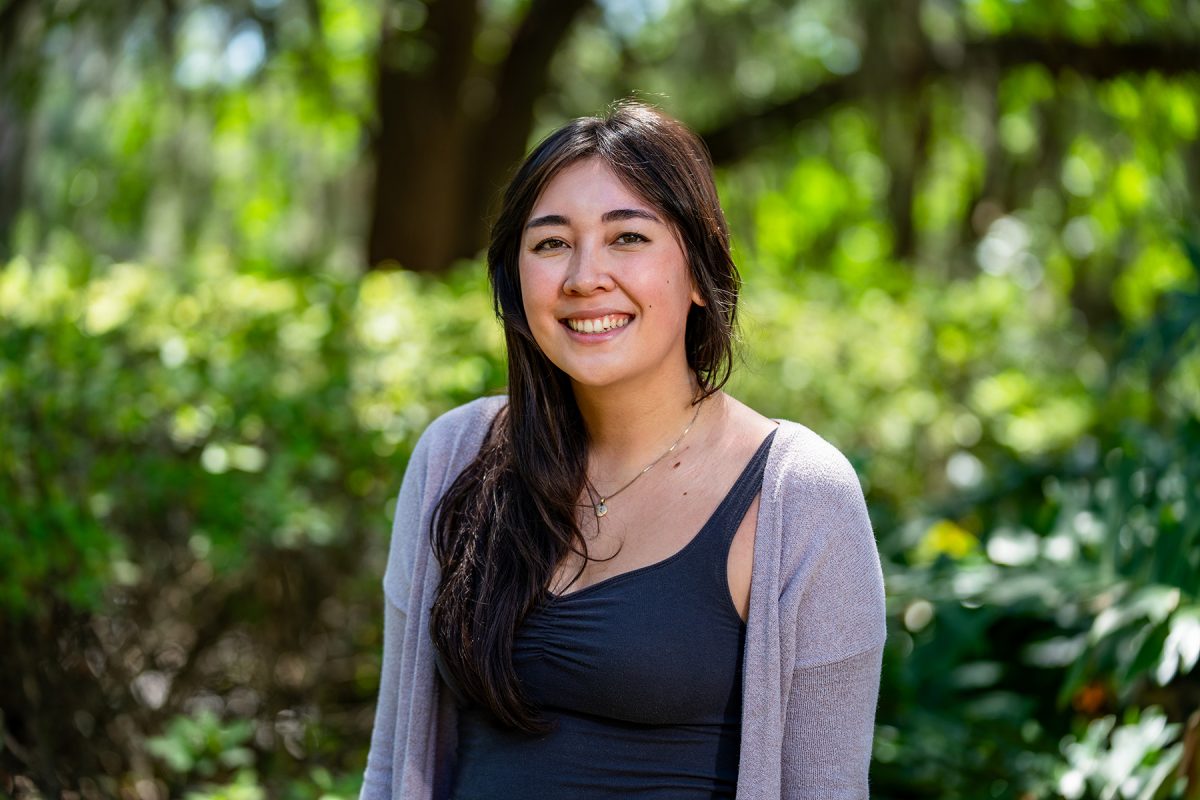
“I’m an avid bird watcher, and I didn’t find a community for me or other young adults like me until I came to FSU”
Fast Facts
- Creative: I love to read and draw
- Observer: If you want to see a bird up close, wait under the Bio Unit 1 walkway
- Aloha!: I’m Native Hawaiian
- Adventurous: I’m an avid birder and love to hike
- Coffee Lover: The best coffee on campus is the Red Eye Café in the Medical School
Traysea Nycole Malama-Auger, a biological science student at the College of Arts and Sciences, chose to attend Florida State University because of the natural spaces that surround Tallahassee, like the Apalachicola National Forest, the St. Marks Wildlife Refuge and a myriad of natural springs. After some time at FSU, she also grew to love the university for its many resources, such as the faculty and staff who helped her follow her passion for wild birds. During her time at FSU, Malama-Auger conducted research, created a new club called the “Spoonbill Society” and made new connections along the way. After graduation, she plans to continue researching birds.
What do you still hope to achieve with the Spoonbill Society?
I’m an avid bird watcher, and I didn’t find a community for me or other young adults like me until I came to FSU. In my first or second semester, I started the Spoonbill Society, which is a pretty active birding club here at FSU. Although I’m graduating shortly, I’m hopeful my club will persist long after I leave. ‘Spoonbills’ (members of the Spoonbill Society) are responsible for collecting data on the avian window strikes across campus, and I’m hopeful that the project continues, and that the data will be used to inform campus building decisions to mitigate anthropogenic effects in the future. We also recently acquired a set of binoculars for club use, and it’s my hope that people who want to bird watch but can’t afford to can come to our outings and appreciate birds with us. I’ve left my club in the most capable of hands (thank you, Kaya Simmons and Lucas Pittman!), and I know they’ll pick up right where I left off.
What resources at FSU did you find the most useful?
There are almost too many to mention. First and foremost, Dr. Emily DuVal has been foundational to everything I’ve accomplished during my time here. She is not only one of the most intelligent, passionate and creative people I’ve ever met, but she’s also an excellent mentor to her students. In anything I want to pursue, she’s right there with me, guiding me with sage advice and words of encouragement. Dr. Pearl Rivers Key has also been an excellent mentor and collaborator, and I’m incredibly grateful for the time both researchers have poured into my education.
Asia Duren, the coordinator for Student Organizations & Involvement, was helpful in getting the Spoonbills started and continues to be my point of contact for all my questions related to RSO’s inner workings.
April Wooten in the Department of Biology graduate student advising has helped me with a lot of logistical stuff related to my degree and club, as well as helping to prepare me for graduate school. In the same vein, the entire undergraduate advising staff has offered me concise, helpful advice on completing my degree on time. As a transfer student, I am massively grateful.
Finally, the Center for Undergraduate Research and Academic Engagement (CRE) and the Office of National Fellowships (ONF) have been some of the most important departments on campus for helping me prepare for graduate school. The CRE has financially supported my research and offered many venues for me to present it, and the ONFs have been a goldmine for resources related to graduate school funding and grant writing. ONF also supports alumni in their post-grad pursuits, which is incredibly helpful.
What was your favorite part about conducting research?
I think most people’s perception of science, including mine in the beginning, is that it is separate from artistic and creative pursuits. My favorite part of the research was realizing that this job combines both — that the best experiments are ingeniously creative and concretely analytical. I’m hopeful that I can contribute to that body of work in a meaningful way.
Besides that, research has taken me to many places and allowed me to see things I never thought I would! I’ve been lucky enough to see the oldest untouched longleaf pine forest in the Southeast, in museum collections I’ve seen extinct and rare specimens of birds (including THE Lewis Woodpecker collected by Merriweather Lewis himself), and I’ve traveled to a couple of states, too. Plus, I get to see and hold so many birds up close — who else can say something like that?
Whether through the Spoonbill Society, research or other means, what legacy do you hope to leave at FSU after you graduate?
I’ve never given any thought to legacy, to be frank. My time at FSU has been so short and jam-packed that I’ve never given much thought to what I was leaving behind. I’m lucky enough to have two undergraduates, Kaya Simmons and Lucas Pittman, to continue my most meaningful project, the Spoonbills. If I could come back in a decade and find the club active with a long-term dataset of avian window strikes on campus, I would weep with joy.
What are your plans for after graduation?
I hope to get a doctorate in ecology and evolutionary biology and continue working with birds as a model species. I also want to ask creative and exciting questions about animal behavior and do exciting field work!



